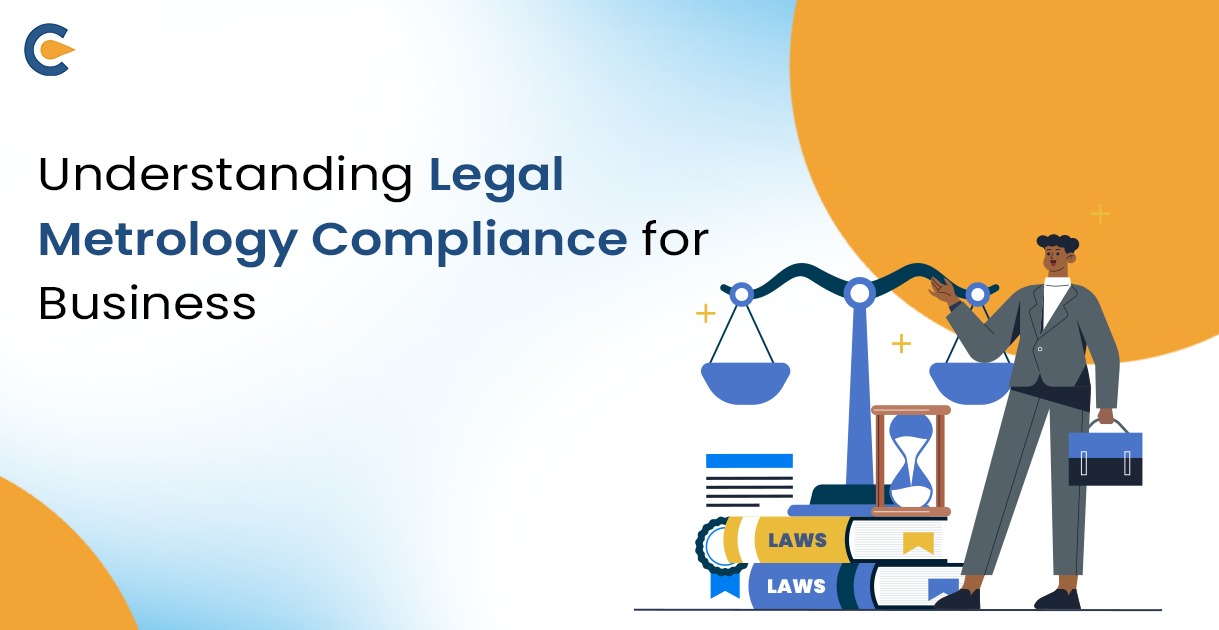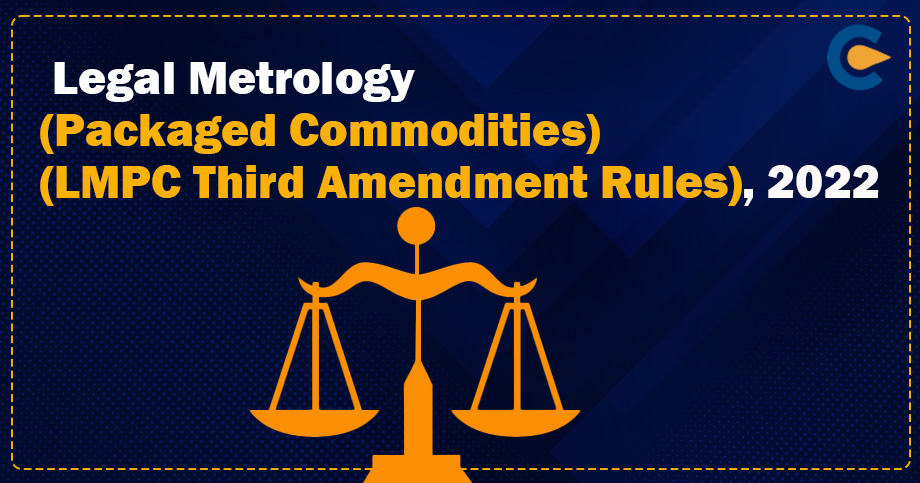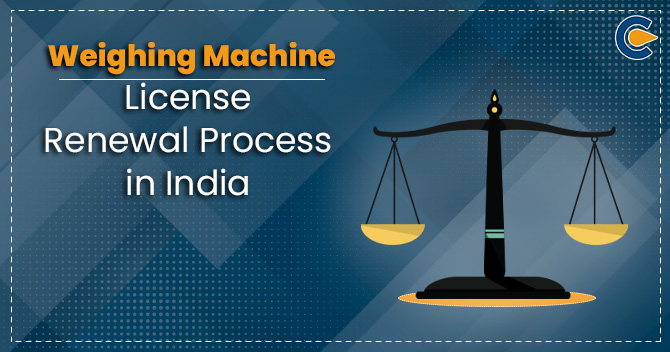In India, there are several phases involved in launching a pre-packaged commodities company. To start a pre-packed Legal Metrology Compliance for Business in India following the general guide:-
Market Research: To determine the demand for pre-packaged goods in your selected industry, carry out in-depth market research. Recognize your competition, your target market, and the general trends of the industry.
Business Plan: Draft a thorough business plan that outlines your objectives, target market, marketing approach, projected financials, and schedule of operations. This document is going to be your business’s road map.
Legal Structure: Choose from an LLC, private limited company, partnership, or sole proprietorship as the legal form for your firm. Obtain a business registration from the relevant authorities.
Regulatory Compliance: Learn about the legal requirements in India for launching a pre-packaged commodity business. Obtain the required authorizations and permits from the appropriate authorities for food goods, including the Food Safety and Standards Authority of India (FSSAI).
Select a Specialty: Choose the precise pre-packaged goods that you wish to sell. Packaged foods, sauces, spices, pulses, and other consumer goods may fall under this category.
What is a Legal Metrology Certificate in India?
That department is the Legal Metrology Department, which issues legal metrology certificates in India to carry out the specified control. A department that can keep an eye on the quality of the imports is required to supervise an importer who packs things before distributing or selling them. The LMPC Act, which regulates the certification process, is the complete version of legal metrology compliance. The LMPC certificate, sometimes referred to as an import license, is to be sought no later than ninety days from the start of the import.
Where should one apply for an LMPC Certificate?
For an LMPC certificate both offline and online applications are accepted for Legal metrology compliance. Many Indian states help with this registration on a state-by-state basis. You can submit your application in person at your city’s LMPC department if online facilities are not available. You may also choose to pay for legal counsel, in which case you would let the relevant party handle all the paperwork. Numerous officials support people in these areas and aid with application filing.
Who requires an LMPC license?
Companies that produce, package, or import pre-packaged goods require an LMPC license, they should contact the legal metrology authorities to find out the requirements and steps involved in acquiring and renewing a license for legal metrology compliance.
- Manufacturers: Businesses that produce goods that are already packed must have a license that ensures legal metrology compliance. This comprises companies that manufacture products that are packed and offered for sale to customers in set amounts.
- Packagers: Legal metrology compliance is necessary for organizations that package pre-packaged goods, even if they are not the product’s original makers. This guarantees that legal metrology compliance standards are followed during the packing process.
- Importers: Companies that bring in pre-packaged goods into India must have an LMPC license. Ensuring compliance with Indian legal metrology compliance rules, which encompass precise weight and measure labelling, is imperative.
- Re-packagers: Companies that engage in the repackaging of goods that have already been packed must also apply for a Legal metrology compliance license. This is relevant for products that are repackaged into smaller pieces for retail sale after being received in bulk.
It’s crucial to remember that for Legal metrology compliance only applies to pre-packaged commodities or products of any kind placed within a box without giving the customer a chance to choose what’s inside. For non-pre-packaged items, when the customer can examine and select the item before packaging, a license is not needed.
Businesses that sell loose or unpackaged products—like fruits, vegetables, or grains—usually don’t need an LMPC license. They could, however, have to abide by additional legal metrology compliance requirements pertaining to scales and measuring devices.
The Necessity of Paperwork Required for LMPC License Renewal
The necessity of paperwork required for LMPC license renewal is one of the key points to keep in mind. While completing the form, the applicant must review the list of papers that must be supplied. Examining the documentation helps the applicant and clears up any misunderstandings that can arise at the last minute.
An applicant can avoid any type of objection arising from missing or erroneous documentation by submitting the necessary paperwork, which is crucial in the LMPC License Renewal process. The LMPC controversy will also be avoided by timely and accurate document filing. Nonetheless, the commodity’s maker, dealer, importer, or packer receives the license. After a specific amount of time, the license must be renewed by the applicant, who must do so by filling out an application and providing the extensive list of papers needed for the LMPC License Renewal.
Importance of Legal Metrology Department for Renewal of LMPC License
Following is the importance of legal metrology department for renewal of LPMC license for legal metrology compliance:
- Legal metrology is a field with a broader scope than most things. Since the COVID-19 pandemic, people’s reliance on online platforms for commodities buying and selling has grown, and they prefer doing business online not only to save time but also because it is healthier.
- The actions of a manufacturer, repairer, dealer, or importer of pre-packaged goods or weights and measures are handled by legal metrology.
- For those who make, repair, or deal in weights and measures, Legal Metrology has established certain policies and procedures. Adherence to the legal metrology compliance is necessary for all manufacturers and individuals involved in the handling of weights and measures.
- If the act is not followed, nevertheless, there may be a dispute in legal metrology compliance and the offender might be punished under the Indian Penal Code or face fines or jail time as stipulated by the Act for legal metrology compliance.
- Manufacturers, dealers, and bait repairers must present certain papers as outlined by the LMPC Act.
- The legal metrology compliance officer inspects a manufacturer’s production facility to examine a dealer, importer, packer, or repairer of measurements and weights.
- The Legal Metrology Department has offices in every state in the union. The department’s officials assisted with the application and evaluated them should the applicant need any more assistance.
Difficulties with Legal Metrology Compliance Certificate
An applicant faces many difficulties with a legal metrology compliance certificate. Although getting a certificate is necessary, companies also need to be conscious of continuous compliance obligations. It is essential to overcome these difficulties with legal metrology compliance to avoid fines and penalties.
Here are a few difficulties with legal metrology compliance certificate at the time of certificate registration:
1. Amending the Regulations:
It can be difficult to keep up with changing standards and regulations; regular monitoring is necessary to guarantee continued compliance.
2. Complexity of Standards:
Businesses may find it difficult to appropriately comprehend and apply legal metrology compliance standards due to their complexity.
3. Instrument Calibration:
It can be logistically difficult to guarantee that weighing and measuring devices stay accurate and calibrated over time, particularly in fast-paced corporate settings.
4. Paperwork Management:
A methodical strategy is necessary for maintaining and updating the necessary paperwork, which includes records of tests, certifications, and inspections.
Compliance measures include:
- Internal controls and routine audits: To routinely evaluate compliance, conduct internal audits. Create strong internal controls to quickly detect and address any deviations.
- Employee Education: Educate staff members on LMPC requirements to raise awareness and guarantee that all parties are aware of and observe compliance guidelines.
- Continuous Monitoring: Put in place mechanisms for monitoring processes and instruments continuously, making sure that any deviations are quickly identified and corrected.
- Adaptable to Changes in Regulations: Keep an eye out for changes in requirements and be quick to adjust. This entails quickly modifying procedures and tools to conform to revised requirements.
- Record-Keeping: Keep complete and accurate records of all operations, certifications, and inspections relating to compliance. When conducting audits or inspections, this paperwork is essential.
- Communication with Authorities: Create channels of open communication with authorities in the LMPC field. To maintain openness, let them know about any modifications to the equipment or business procedures.
Businesses can mitigate the possibility of fines or legal ramifications by proactively developing compliance procedures and resolving these obstacles in order to not only achieve the LMPC Certificate but also maintain a culture of continuous adherence to standards.
Legal Metrology Certificate Renewal
Legal Metrology Enforcement Rules 2011 Rule 11 states that the legal metrology certificate renewal application must be filed at least thirty days before the original license’s expiration date. The following procedures can be followed in order to renew a LMPC certificate:
- The candidate sends an application for renewal to the relevant Legal Metrology Department.
- The application is sent together with the necessary payment and other pertinent data.
- The application is received by the Assistant Controller of Legal Metrology.
- After reviewing the application for renewal, the Assistant Controller designates an officer to inspect the applicant’s premises.
- The Assistant Controller receives the inspection reports and recommendations that the inspector sends to the department after conducting inspections.
- These suggestions are taken into account by the Assistant Controller along with the renewal application.
- After that, the Assistant Controller sends their recommendation to the Deputy Controller/Controller at the Legal Metrology Department, who decides whether to approve or deny the applicant’s request for a renewal.
- After reviewing the advice, the Deputy Controller or Controller issues a signed renewal LMPC certificate or license to the applicant if they are pleased.
Advantages of Renewal of LMPC license
The advantages of renewal of LMPC license for legal metrology compliance are:
1. Decrease in Transaction Fees:
By creating a standardized and controlled system for weights and measures, the renewal of a legal metrology license has the advantage of lowering transaction fees. Adhering to legal metrology compliance standards helps organizations minimize disputes and reconciliation procedures by ensuring accuracy and fairness in transactions. The trading environment is made more economical and efficient by this decrease in transaction-related expenses.
2. Promoting commerce:
By creating an equitable and open market, the renewal of legal metrology licenses is essential to promoting commerce and for legal metrology compliance. Companies that follow the law on metrology help create an even playing field so that everyone in the market may compete fairly. In the end, fair trade practices help firms and consumers alike by promoting healthy competition and improving overall market stability.
3. Gain Client Confidence:
Regular license renewals that adhere to LMPC compliance increase customer trust. Businesses that follow established measuring standards are more likely to be trusted by customers because they guarantee the dependability and accuracy of their goods and services. In addition to helping specific companies, the trust in impartial procedures and precise measures upholds the integrity of the market as a whole, fostering a favourable atmosphere for both customers and companies.
4. Government Revenue Collection:
A direct contribution to government revenue collection is made by the renewal of valid metrology licenses. The renewal procedure fees raise money that may be given to the regulatory agencies in charge of metrology standards. In order to maintain the efficacy of the LMPC system, this money assists in funding the infrastructure needed for inspections, enforcement, and ongoing advancement of metrological standards.
5. Reduce Trade Technical obstacles:
By creating a uniform system for weights and measures, the renewal of an LMPC license contributes to the reduction of trade technical obstacles. Because items that adhere to these standards are more likely to fulfil the same measurement criteria, cross-border trade is facilitated more smoothly. By lowering the difficulty and expenses of adjusting to various metrological systems, this uniformity promotes trade across nations.
Professional Assistance from Corpbiz
Any manufacturing, retailing, or wholesale business must renew its LMPC license because it certifies that the product has been packaged and labelled in accordance with the regulations. Our specialized experts in LMPC at Corpbiz will handle the LMPC License Renewal procedure for you. Our professional licensing and industrial compliance help services will guarantee a quick, economical, and error-free LMPC License Renewal procedure.
Frequently Asked Questions
Go to the “Track Your Application” area of the website. The status of your application will then show on the screen once you input your Application ID in the tracking form.
You will receive an SMS on the mobile device you have registered with a link to download the electronically signed certificate from the e-District portal after your application has been verified by the Assistant Controller of the Legal Metrology Department. Use your application number to access the portal and download the certificate.
In order to ensure public assurance regarding the security and accuracy of the weights and measurements, legal metrology addresses units of weight and measurement, methods of weighing and measurement and weighing and measuring instruments in relation to the necessary technical and legal requirements.
It is true that violations of the packaged commodities rules can be compounded.
“Pre-packaged commodity” refers to a good or service that, in the absence of the buyer, is put in any kind of package—sealed or not—with a predetermined amount of product within.
The certification for an LMPC import license is valid for a minimum of one year or twelve months and a maximum of five years or sixty months.
The Legal Metrology Department issues certificates, known as LMPC certificates, attesting to the fact that any weighing or measuring device used for business purposes has undergone verification and is accurate in accordance with the established standards. The certificate has to be renewed after its one-year expiration date.
Yes, you need both licenses. Every food firm must obtain an FSSAI license in order to guarantee the quality of their products. Similar to this, in order to distribute or sell food packaged goods, you must get an LMPC license from the Ministry of Consumer Affairs.
Absolutely, in order to assure compliance with food safety rules and quality standards throughout the repackaging process, a packer license is necessary for repackaging and relabeling. To do business lawfully and uphold the integrity and safety of food items, a license is required.
Read our Article: Compliance Under Legal Metrology – An Overview











